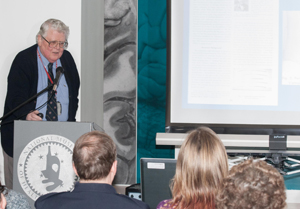Retired Army surgeon joins NMHM to mark 50th anniversary of Vietnam War
By Paul Bello, National Museum of Health and Medicine
SILVER SPRING, Md. - A glimpse into Vietnam War medicine and the creation of the "Medical Museum, 2nd Surgical Hospital" was provided Feb. 24 to attendees at the February 2015 Medical Museum Science Café at the National Museum of Health and Medicine (NMHM). Dr. Norman Rich, a retired U.S. Army surgeon and the program's guest speaker, established the traveling medical museum while serving as chief of surgery at the hospital in An Khe, Vietnam.
During his tour of duty, which began at the mobile Army hospital in 1965, Rich collected items such as punji sticks (a type of wooden stake made of sharpened bamboo), bullets, fragments from explosive devices and other objects from patients he treated, as well as from fellow colleagues in the field. He later donated many of these items to NMHM, which at that time was part of the Armed Forces Institute of Pathology and under the direction of Brig. Gen. Joseph L. Blumberg in Washington, D.C. Many of these items were showcased by NMHM staff during and after Rich's discussion.
"I was encouraged by my mentors to do something unusual, as some had put it. Based on that advice, I came up with the idea for my own medical museum," he said. "There are many opportunities out there if you seize upon them. Fortunately for me, there was an abundance of opportunities that came my way during that period."
Rich provided a slide presentation that included viewpoints American soldiers had while navigating through the jungles of Vietnam. He also showed pictures of various weapons and the wounds he treated while in his Quonset hut operating room. Due to being in such a remote location and emergency evacuation being so difficult, Rich estimated that more than two-thirds of the patients he operated on were held there and eventually went back to duty in country.
He also shared an interesting, yet slightly harrowing story about the time he got back from Vietnam and was asked to give a lecture at the Walter Reed Army Institute of Research (WRAIR) in 1968. Just as he was about to address the audience, Rich recalls being surrounded by several men. They pulled him off-stage and told him he was in a lot of trouble.
"They told me they were still deciding amongst themselves whether I should be court martialed, shot, or sent far away somewhere," he said. "Turns out, they were with the CIA, CID, and FBI. They were after me for the items I sent to the museum from Vietnam."
As it turns out, the weapons and artifacts Rich had boxed up and flown out somehow ended up at McChord Air Force Base in Washington without his knowledge. The boxes sat there for about a year before someone finally decided to send them to Rich, but not before alerting authorities that they were going over state lines.
"The charges they initially had against me were phenomenal. What saved me in the end was that I was very thorough and had catalogued everything that was given to me while at the hospital," Rich said. "I also had a signed letter from AFIP stating their desire for the items. I'm not sure what would have happened to me without it."
Rich, who grew up in a small Arizona copper mining town, later became chief of vascular surgery at Walter Reed. He was also appointed professor of surgery for the School of Medicine at the Uniformed Services University of the Health Sciences (USUHS) in 1976. He became department chairman a year later and remained in that position until his retirement in 2002.
"Every time we go to war, we have to start all over again," Rich said. "One of the things we're trying to do at the Uniformed Services University is to prepare people to be more ready for the management of patients. That priority will never change."
Earlier in the evening, a small group of Vietnam War veterans attending the program, including Rich, were acknowledged by the Department of Defense's (DoD) Vietnam War Commemoration Committee for service to their country. Each was awarded a merit pin following a video presentation that included a message of thanks from President Barack Obama.
"We've had so many items come into our museum related to Vietnam that we wanted to offer a program in conjunction with the U.S. Vietnam War Commemoration that's part of a larger nationwide initiative to educate the public about those who served and what we learned from that experience, particularly as we commemorate the 50th anniversary of the Vietnam War," said Andrea Schierkolk, public program manager for NMHM.
NMHM's Medical Museum Science Cafés are a regular series of informal talks that connect the mission of the DoD museum with the public. NMHM was founded as the Army Medical Museum in 1862 and moved to its new location in Silver Spring, Maryland in 2012. For more information on the program, call 301-319-3300 or visit www.medicalmuseum.mil.

|
Caption:
Dr. Norman M. Rich, a retired Army colonel and renowned vascular surgeon, speaks about his experiences during
the Vietnam War, on Feb. 24, 2015 at the Medical Museum Science Café, held at the National Museum of Health
and Medicine, Silver Spring, Md. (Disclosure: Portions of this image have been masked to protect PII. This image has been cropped to emphasize the subject.) (National Museum of Health and Medicine photo by Paul Bello/ Released) |



